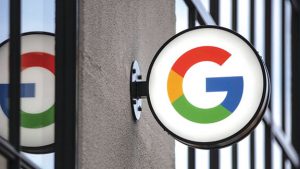Bloomberg
The US Supreme Court is poised to hear a case that could spell danger for the internet’s most lucrative business: online advertising.
The case, Gonzalez v. Google, will be argued on Tuesday and centers on whether internet companies are liable for the content their algorithms recommend to users. The tech industry says it’s protected by
a legal shield contained in
communications law known as Section 230.
Much of the discussion surrounding the case has focused on the costs to online companies if the court determines they are legally responsible for the hundreds of millions of comments, videos and other content posted by users every day. However, such a decision could also strike at the heart of the automated advertising upon which Meta Platforms Inc.’s Facebook and Alphabet Inc.’s Google rely for the bulk of their revenue. In fact, the social media companies view the case as an existential threat.
“This case could adversely impact the entire advertising ecosystem,†said Marc Beckman, Chief Executive Officer of DMA United, an advertising firm that regularly uses Google and Facebook’s tools to serve targeted ads to potential customers around the world.
Google is being sued by the family of Nohemi Gonzalez, a 23-year-old US citizen who was among at least 130 people killed in coordinated attacks by the IS in Paris in November 2015. The family argues that Google’s YouTube should be held responsible for automated recommendations of IS videos.
Websites and ad networks automatically target ads based on information they have collected about users, including their location, browsing history, topics they follow closely and more. The ads are posted to websites by online tools without human intervention.
A broad ruling by the Supreme Court could effectively snuff out the business of serving personalised ads on the internet and turn online ad practices back to the early 90s, experts say. It could also force the platforms to litigate a wave of lawsuits over the millions of advertisements they target at users, resulting in exponential legal costs for smaller ad
networks and exchanges.
Together, Google and Facebook capture almost 50% of all digital advertising revenues worldwide. The companies, which have been referred to as the “duopoly†of online advertising, collect reams of data about their users in order to serve them relevant ads — a business that mints both companies billions of dollars per year. Globally, Google made $168 billion in ad revenue in 2022 while Meta made $112 billion, according to data analytics
company Insider Intelligence.
This year, Google’s US revenue alone is projected to reach $73.8 billion, while Meta’s is expected to reach $51 billion. A ruling by the high court would only apply to the US, but it would be technically difficult for the companies to handle advertising differently in its largest market than other countries around the world.
The companies are already facing legal challenges over the ads they serve, particularly those that relate to sensitive issues like healthcare, politics, employment opportunities and more. With few exceptions, Facebook and Google successfully win dismissals of most cases that would hold them responsible, thanks to Section 230.
That could change quickly if the Supreme Court decides to narrow Section 230. While the shield protects companies from lawsuits over content generated by ordinary people, Cathy Gellis, a California lawyer who has represented tech companies in online speech cases, said ads could be categorized as “user-generated content†if the Supreme Court’s ruling is wide-ranging.
The digital advertising industry is already coming under fire as governments around the world crack down, arguing that companies collect too much information about people without their consent and violate their privacy. Privacy regulations in countries including the European Union limiting the amount of data companies are allowed to collect on users have already put a huge strain on the digital ads ecosystem, said Beckman.
Online advertising is so key to Meta and Google’s business models, it’s likely they would try to fight it out in court, said Gellis, the California lawyer. They would try to handle the legal costs and see if they could win cases on the merits. “Everybody’s going to try to muddle through as best they can,†Gellis said.
 The Gulf Time Newspaper One of the finest business newspapers in the UAE brought to you by our professional writers and editors.
The Gulf Time Newspaper One of the finest business newspapers in the UAE brought to you by our professional writers and editors.
